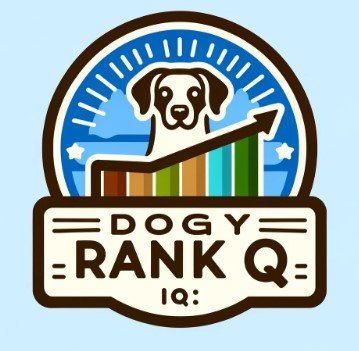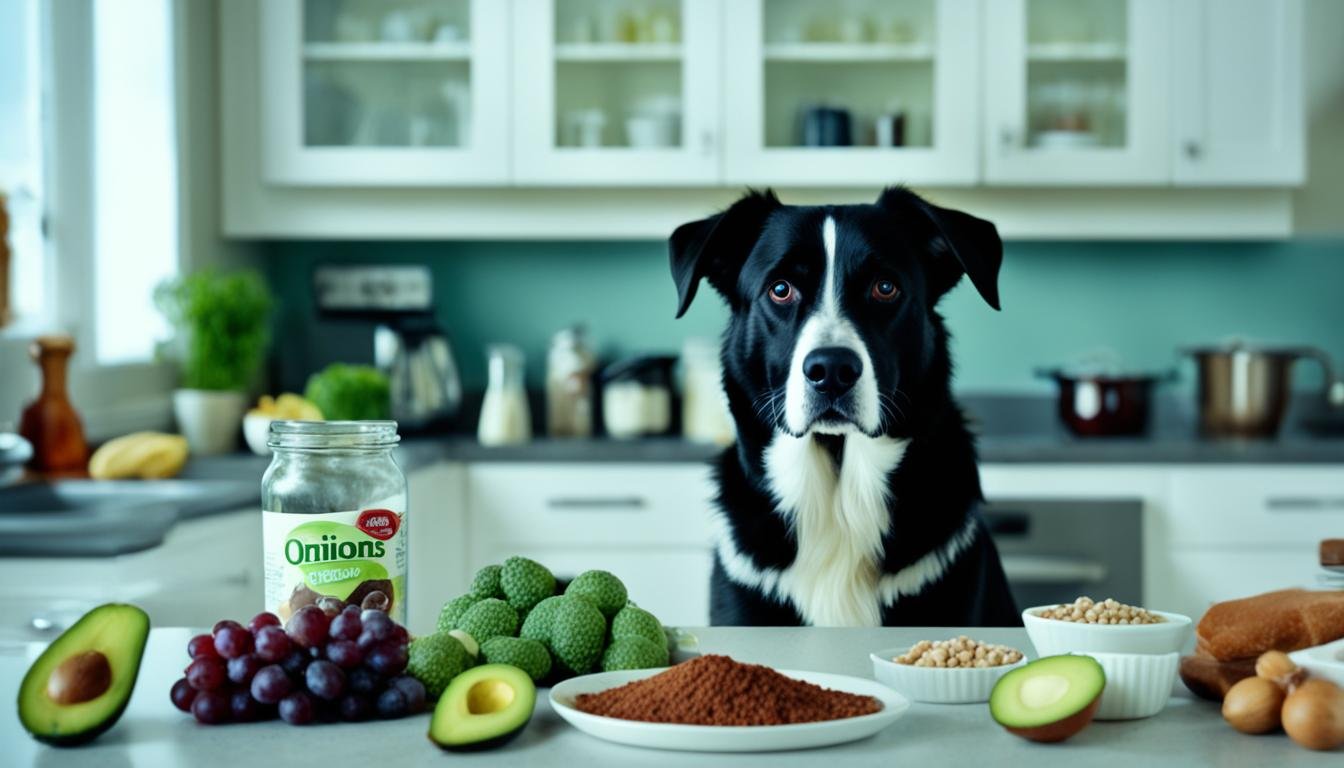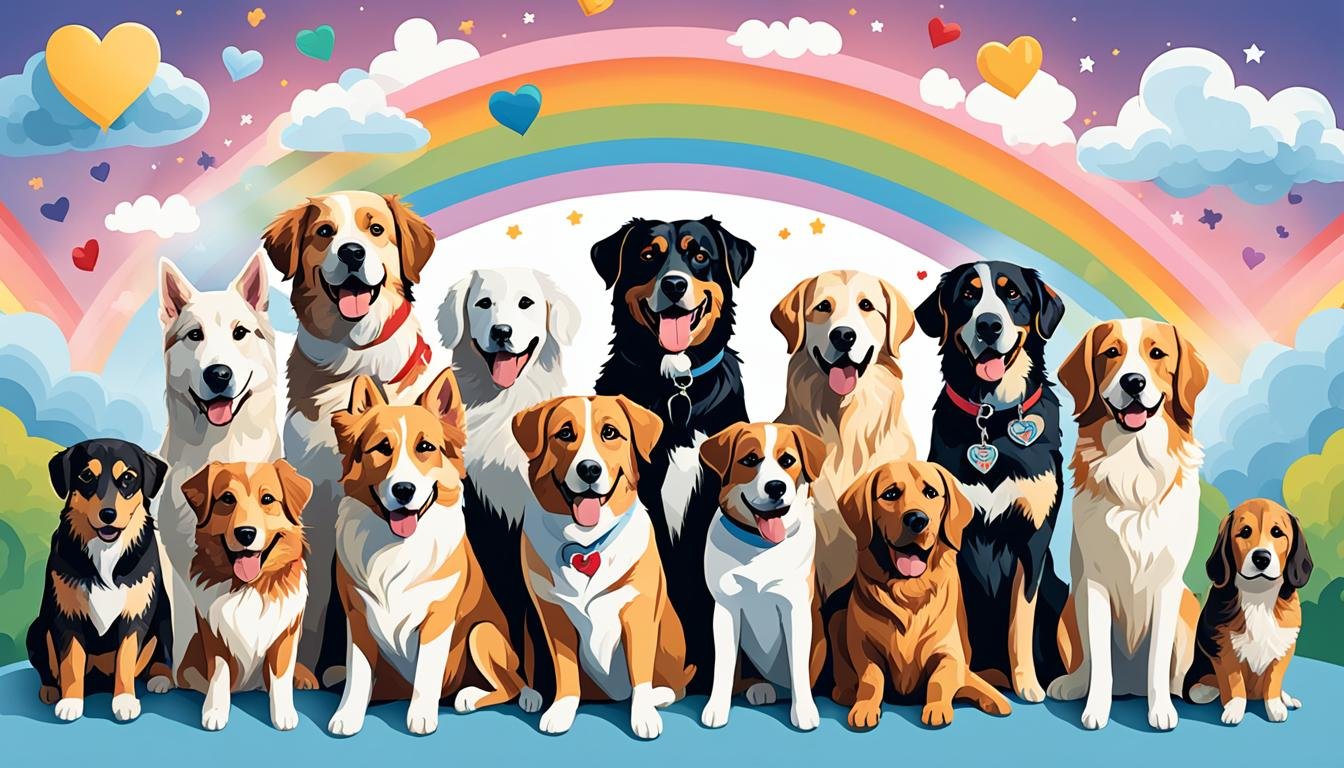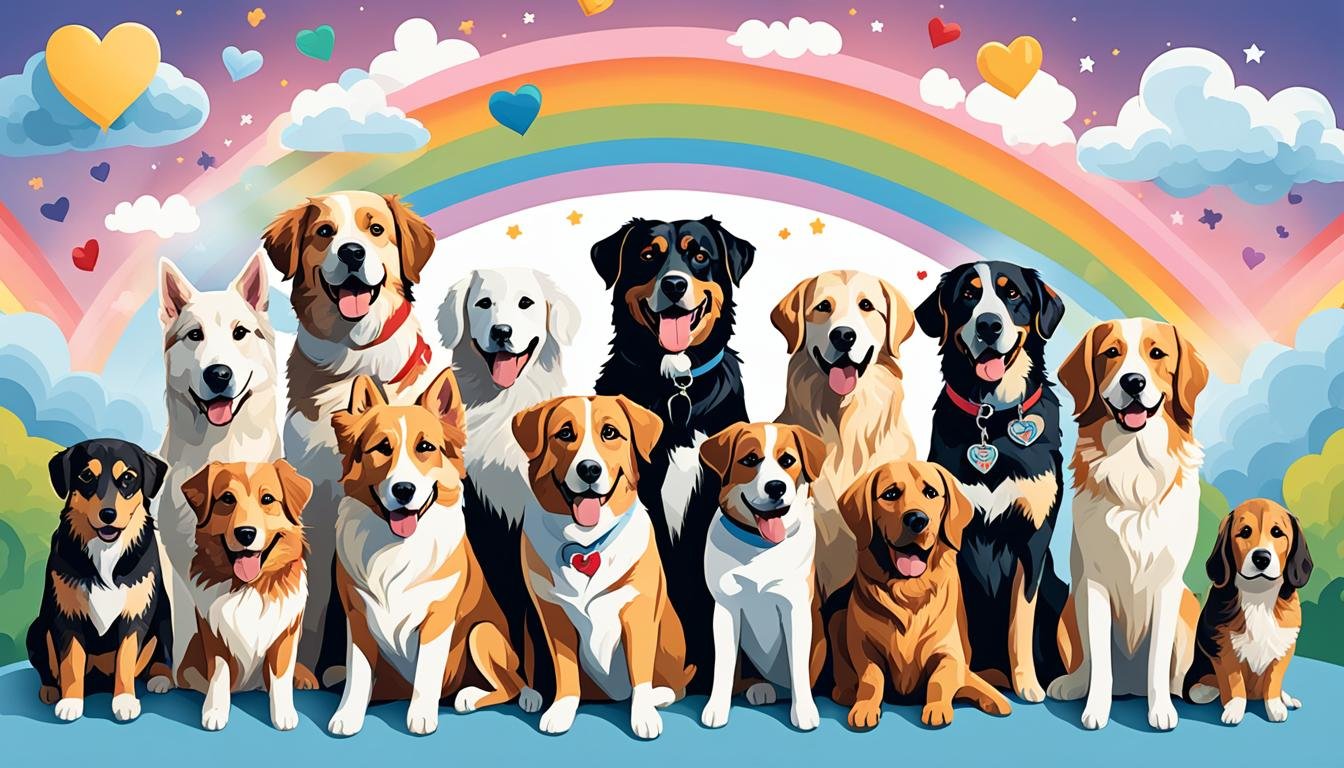Did you know that xylitol, a common sweetener found in candy, gum, toothpaste, baked goods, and some diet foods, can cause a dog’s blood sugar to drop and lead to liver failure? This shocking statistic highlights just how dangerous certain human foods can be for our canine companions. While it may be tempting to share table scraps or snacks with your furry friend, doing so can have serious consequences for their health.
This article provides expert advice on the top foods you should never feed your dog, as well as safer, pet-friendly treat alternatives to keep your pup happy and healthy. By understanding which common human foods pose a risk, you can ensure your dog avoids potential toxins and enjoys a nutritious, balanced diet.
Key Takeaways
- Many people-pleasing foods that are safe for humans can be dangerous or even fatal for dogs.
- Certain sweeteners, like xylitol, can cause a dangerous drop in blood sugar and liver failure.
- Alcohol, caffeine, onions, garlic, grapes, raisins, and chocolate are all highly toxic to dogs.
- Dairy products, raw meat and eggs, bones, and salty snacks can also pose significant health risks.
- Understanding which foods to avoid and providing safe, pet-friendly treats is crucial for your dog’s wellbeing.
Toxic Human Foods for Dogs
As much as we love sharing our favorite treats with our canine companions, many common human foods can actually pose serious threats to their health. Understanding which ingredients and items are toxic for dogs is crucial to keeping your furry friend safe and healthy. Let’s explore some of the top toxic human foods that you should never feed your dog.
Xylitol: A Dangerous Sweetener
Candy, gum, toothpaste, baked goods, and some diet foods are often sweetened with xylitol, a sugar substitute that can be extremely dangerous for dogs. Xylitol can cause your dog’s blood sugar to drop dramatically, leading to liver failure. Early signs of xylitol poisoning include vomiting, lethargy, and coordination problems, and liver failure can happen within just a few days.
Chocolate: Theobromine Toxicity
Chocolate contains toxic substances called methylxanthines, which are stimulants that can stop a dog’s metabolic process. Even just a small amount of chocolate, especially dark chocolate, can cause diarrhea and vomiting in dogs. Ingesting a larger quantity can lead to more severe symptoms like seizures, irregular heart function, and even death.
Onions and Garlic: Red Blood Cell Killers
Onions and garlic, whether powdered, raw, cooked, or dehydrated, can be deadly for dogs. These Allium family plants can kill a dog’s red blood cells, causing a potentially life-threatening condition called anemia. Eating a significant amount, even just once, can lead to symptoms like weakness, vomiting, and breathing problems. Garlic, in particular, is five times more toxic to dogs than other Allium plants.
Caffeine: A Risky Stimulant
Caffeine can be fatal for dogs. Be vigilant about keeping coffee, tea, cocoa, chocolate, colas, energy drinks, and even some cold medicines and pain killers away from your pup. Caffeine is a stimulant that can disrupt a dog’s metabolic processes.
Grapes and Raisins: Kidney Dangers
Grapes and raisins can cause kidney failure in dogs, even in small amounts. Early signs of grape or raisin poisoning include vomiting, sluggishness, and depression. The problem lies in the tartaric acid, which dogs are unable to properly excrete, leading to kidney damage.
Top Foods to Avoid Feeding Your Dog
Alcohol: Liver and Brain Risks
Alcohol can have severe effects on a dog’s liver and brain, causing symptoms such as vomiting, diarrhea, coordination problems, breathing problems, coma, and even death. Just a little beer, liquor, wine, or food with alcohol can be bad for your canine companion. Under no circumstances should your pet be given any alcohol, as it can lead to a range of life-threatening issues, including alcohol toxicity in dogs, canine liver and brain damage, and ethanol poisoning in pets.
Macadamia Nuts: Neurotoxicity Concerns
Keep your dog away from macadamia nuts and foods that contain them. Just six raw or roasted macadamia nuts can make a dog sick, leading to symptoms like muscle shakes, vomiting, high temperature, and weakness in their back legs. Macadamia nuts can cause canine neurotoxicity and severe macadamia nut dangers for dogs.
Avocados: Persin and Obstruction Hazards
Avocados contain a substance called persin, which can cause vomiting or diarrhea in dogs. If you have an avocado tree at home, be sure to keep your dog away from the leaves, seed, bark, and fruit, as persin is present throughout the plant. Additionally, the avocado seed can become stuck in a dog’s intestines or stomach, potentially causing a fatal intestinal obstruction. Avocados pose a significant persin danger and toxicity risk for dogs.
Dairy Products: Lactose Intolerance
Milk and milk-based products can cause diarrhea and other digestive problems for your pup. They can also trigger food allergies, which can cause your dog to itch. Pets, including dogs, generally do not possess significant amounts of the lactase enzyme needed to break down lactose in dairy, leading to canine digestive issues and lactose sensitivity.
Risky Foods for Canine Diets
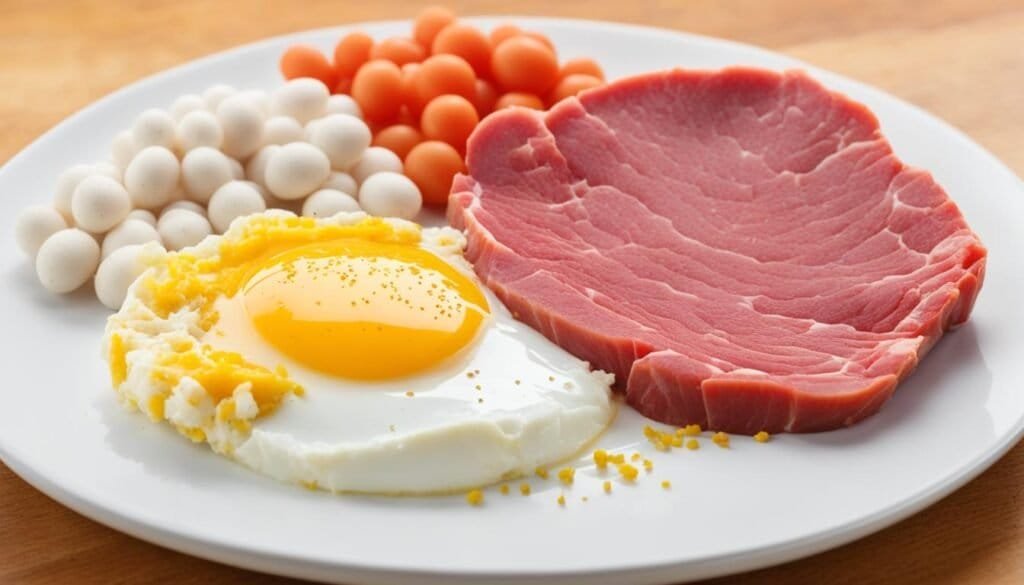
While it may be tempting to share your favorite human foods with your canine companion, it’s crucial to understand which items can pose serious health risks to dogs. From bacterial dangers in raw meat and eggs to the life-threatening consequences of salty snacks and yeast dough, pet owners must be vigilant about their pup’s diet.
Raw Meat and Eggs: Bacterial Risks
The major veterinary medical associations don’t recommend a “raw diet” that includes uncooked eggs, as there’s a chance of food poisoning from bacteria like salmonella or E. coli. Raw meat and raw eggs can contain these harmful bacteria that can make your pet sick.
Bones: Choking and Obstruction Hazards
Even though it may seem natural to give a dog a bone, they can actually choke on it. Bones can also splinter and block or cause cuts in your dog’s digestive system. Feeding your pet raw bones may seem harmless, but it can be very dangerous.
Salty Snacks: Sodium Ion Poisoning
It’s not a good idea to share salty foods like chips or pretzels with your dog. Eating too much salt can make your dog seriously thirsty and lead to sodium ion poisoning, with symptoms like vomiting, diarrhea, depression, tremors, high temperature, and seizures that may even cause death. Avoid feeding salt-heavy snacks to your dogs.
Yeast Dough: Bloating and Alcohol Risks
Before bread dough is baked, the yeast makes it rise, and that’s exactly what it would do in your dog’s stomach if they ate it. As the dough expands, it can stretch your dog’s abdomen and cause a lot of pain. The yeast also ferments the dough to produce alcohol, which can lead to alcohol poisoning. Yeast dough can also cause bloating in pets, which can be life-threatening.
Pet-Safe Treat Alternatives

While it’s tempting to share your favorite foods with your canine companion, it’s crucial to understand which human foods are safe and which can be dangerous for your furry friend. Thankfully, there are plenty of delicious and nutritious dog-safe human foods and healthy pet treats that you can offer your pup as a special snack or reward.
Lean Meats: Cooked and Deboned
Most dogs do well when fed cooked meat options that have been thoroughly cooked and deboned. Be sure to remove all visible fat, including the skin on poultry, before offering these dog-friendly protein sources to your pup. Fully cooked, plain salmon is an excellent choice, providing essential amino acids and good fats that promote joint and brain health.
Fresh Fruits: Seedless and Peeled
Slices of apples, oranges, bananas, and watermelon can make tasty and safe fruit treats for dogs, but it’s important to remove any seeds, stems, or leaves first, as these can pose serious problems if consumed. The peeled and seeded fruit treats are a great way to offer your dog a sweet, nutritious snack.
Vegetables: Plain and Cooked
Your dog can enjoy a healthy veggie snack of carrot sticks, green beans, cucumber slices, or zucchini slices. Even a plain baked potato is okay, but be sure to avoid feeding your pup any raw potatoes or potato plants. When preparing cooked vegetable treats for your dog, keep them simple and free of seasonings or sauces.
Carbohydrates: White Rice and Pasta
For safe carbs for dogs, stick to plain, cooked white rice or pasta. These plain cooked grains and dog-approved starches are easier on the digestive system than complex carbohydrates or raw potatoes, and can even help soothe an upset stomach when paired with boiled chicken.
Conclusion
While it may be tempting to share your favorite foods with your canine companion, it’s crucial to understand which human foods can be dangerous or even life-threatening for dogs. By educating yourself on the top toxic ingredients and risky items, you can keep your furry friend safe and healthy. Remember to stick to a balanced, high-quality dog food as the foundation of their diet, and only offer approved, pet-friendly treats in moderation. With a little caution and the right information, you can enjoy many happy, healthy years with your beloved dog.
As a responsible pet owner, it’s important to be vigilant about the foods you provide to your dog. Certain seemingly harmless human foods, such as chocolate, onions, and grapes, can pose serious health risks and even prove fatal if ingested. By understanding the potential dangers and avoiding these toxic items, you can ensure your dog’s well-being and prevent costly veterinary emergencies.
In addition to steering clear of the hazardous human foods highlighted in this article, it’s also crucial to choose a high-quality, nutritious dog food that is free from unnecessary additives and fillers. Opt for products that use human-grade ingredients and avoid low-quality meat meals, artificial preservatives, and potentially harmful sweeteners. This commitment to your dog’s dietary needs will pay dividends in the form of improved overall health, reduced risk of chronic conditions, and a longer, happier life for your beloved canine companion.
FAQ
What are the dangers of xylitol for dogs?
Candy, gum, toothpaste, baked goods, and some diet foods are sweetened with xylitol, which can cause your dog’s blood sugar to drop and lead to liver failure. Early symptoms include vomiting, lethargy, and coordination problems, and liver failure can happen within just a few days.
Why is chocolate dangerous for dogs?
Chocolate contains toxic substances called methylxanthines, which are stimulants that stop a dog’s metabolic process. Even just a little bit of chocolate, especially dark chocolate, can cause diarrhea and vomiting. A large amount can cause seizures, irregular heart function, and even death.
How can onions and garlic harm dogs?
Onions and garlic — powdered, raw, cooked, or dehydrated — can kill a dog’s red blood cells, causing anemia. Eating a lot just once can cause poisoning, leading to symptoms like weakness, vomiting, and breathing problems. Garlic is five times more toxic to dogs than the rest of the Allium plants, and can create anemia, causing pale gums, elevated heart rate, weakness, and collapse.
What are the risks of caffeine for dogs?
Caffeine can be fatal for dogs. Watch out for coffee, tea, cocoa, chocolate, colas, and energy drinks, as well as some cold medicines and pain killers. Caffeine is a stimulant that can stop a dog’s metabolic process.
Why are grapes and raisins dangerous for dogs?
Grapes and raisins can cause kidney failure in dogs. Just a small amount can make a dog sick, with early signs including vomiting, sluggishness, and depression. The problem in grapes and raisins is the tartaric acid, which dogs are unable to excrete, leading to kidney failure.
What are the risks of alcohol for dogs?
Alcohol has the same effect on a dog’s liver and brain that it has on people, but it takes a lot less to hurt your dog. Just a little beer, liquor, wine, or food with alcohol can be bad, causing vomiting, diarrhea, coordination problems, breathing problems, coma, and even death. Under no circumstances should your pet be given any alcohol, as it can cause serious harm.
Why are macadamia nuts dangerous for dogs?
Just six raw or roasted macadamia nuts can make a dog sick, leading to symptoms like muscle shakes, vomiting, high temperature, and weakness in their back legs. Macadamia nuts can cause weakness, depression, vomiting, tremors and hyperthermia in dogs. Signs usually appear within 12 hours of ingestion and can last approximately 24 to 48 hours.
What are the risks of feeding dogs avocados?
Avocados have something called persin, which is fine for people who aren’t allergic to it, but too much might cause vomiting or diarrhea in dogs. If you grow avocados at home, keep your dog away from the plants, as persin is in the leaves, seed, and bark, as well as the fruit. The avocado seed can also become stuck in the intestines or stomach, and obstruction could be fatal. Avocado is primarily a problem for pets like birds, rabbits, donkeys, horses, and ruminants including sheep and goats, as it can cause cardiovascular damage and death.
Why should I avoid feeding my dog dairy products?
Milk and milk-based products can cause diarrhea and other digestive problems for your pup. They can also trigger food allergies, which can cause your dog to itch. Pets do not possess significant amounts of lactase, the enzyme that breaks down lactose in milk, so dairy products cause them digestive upset.
